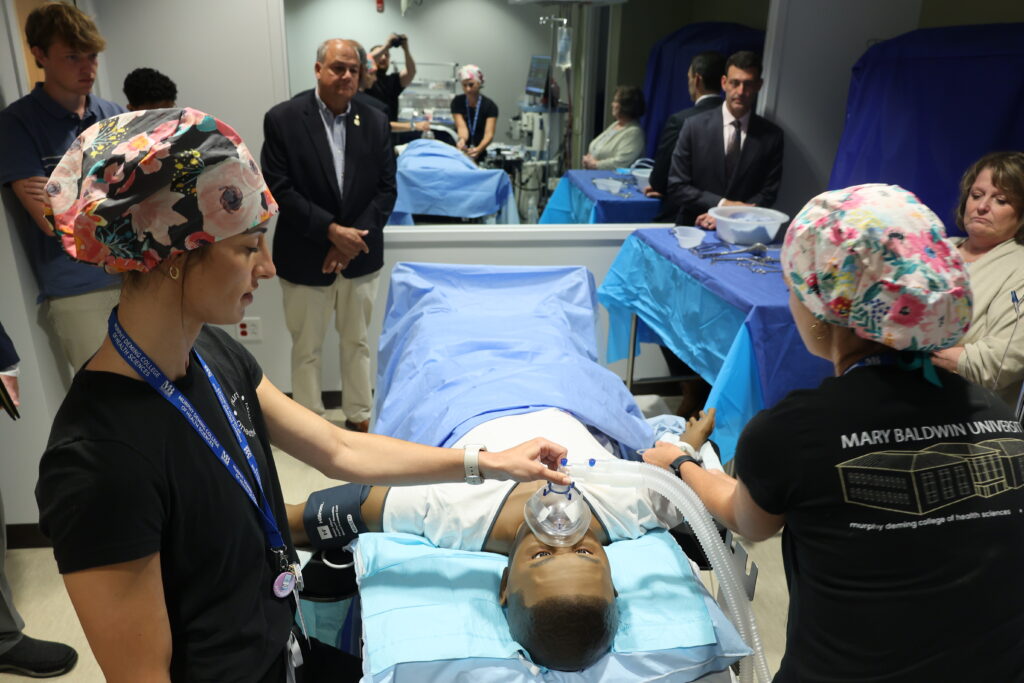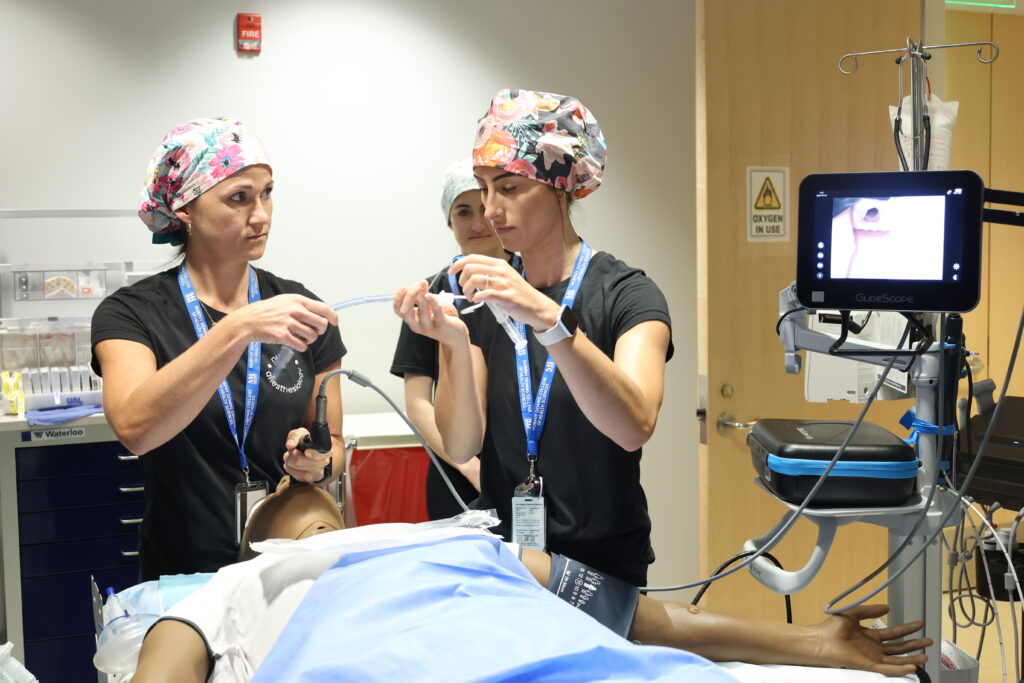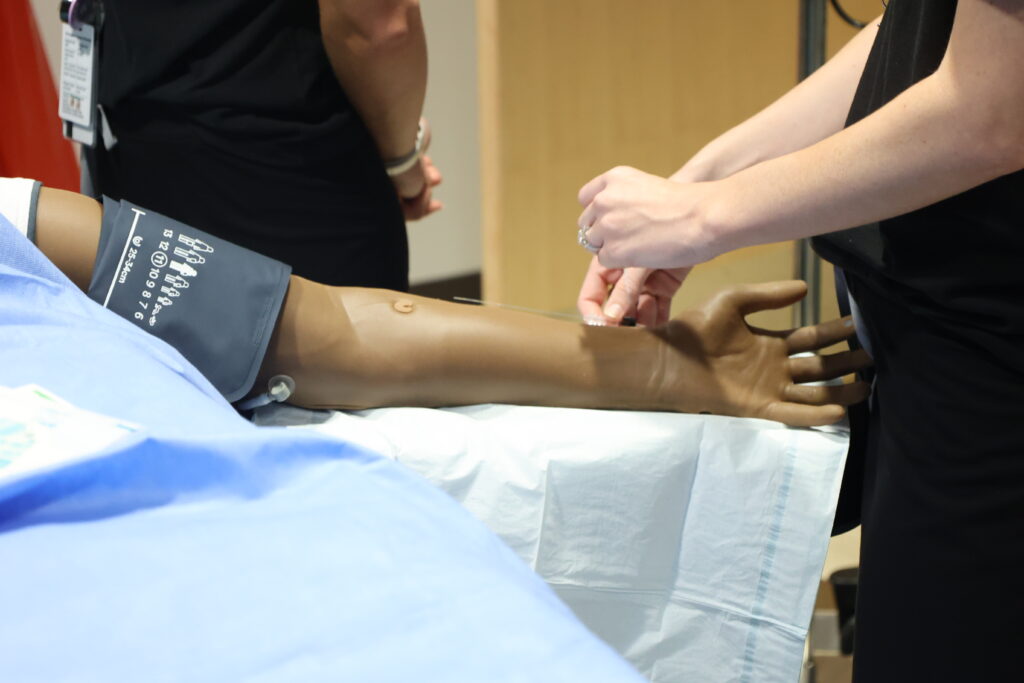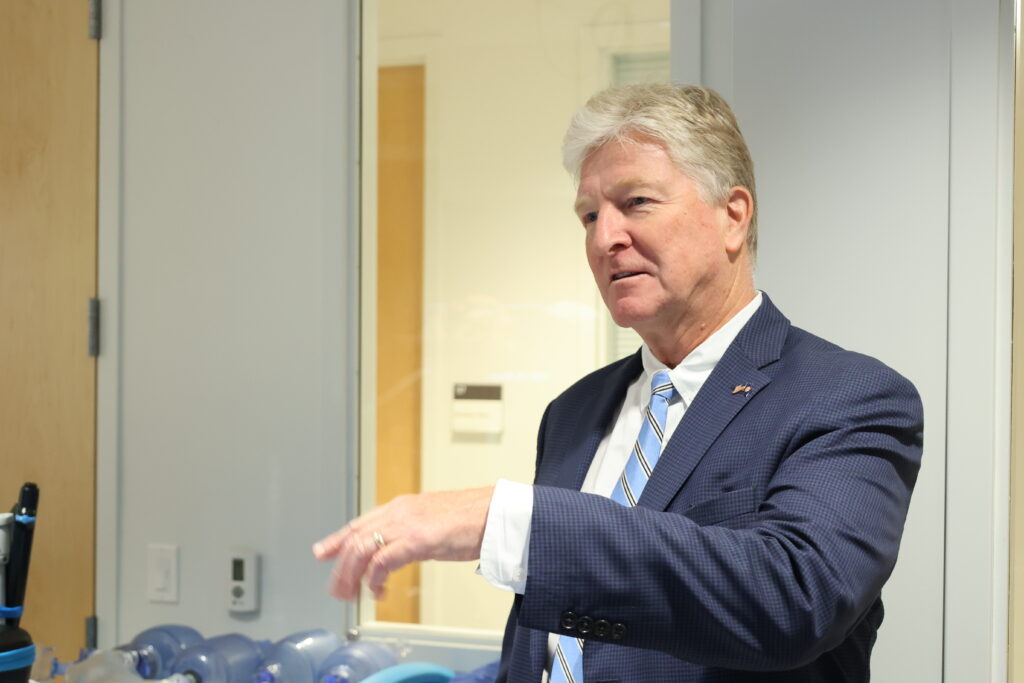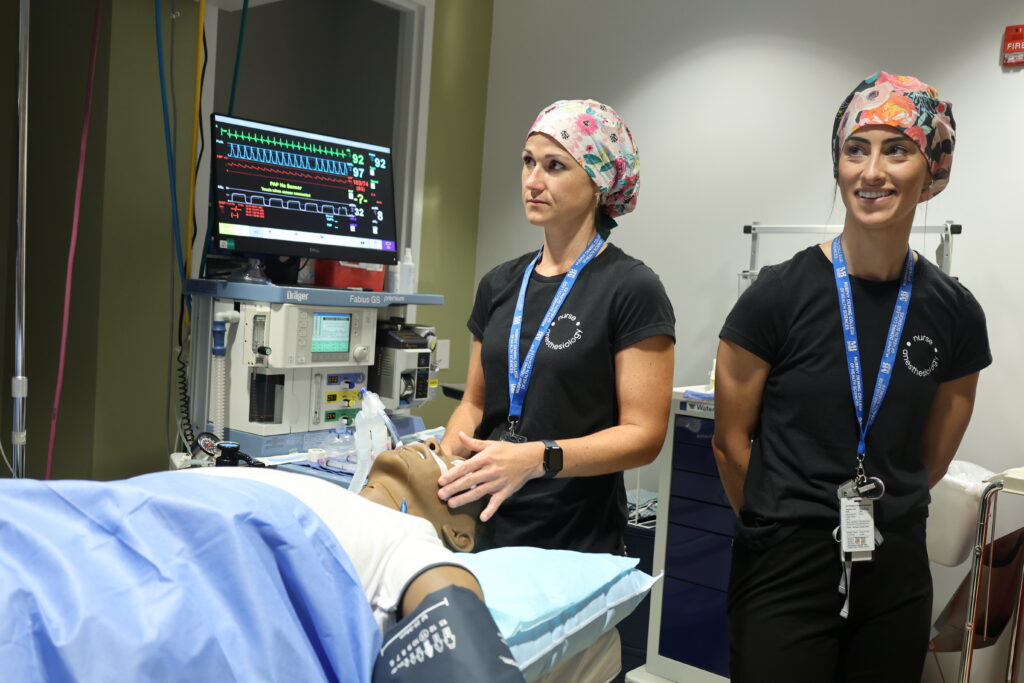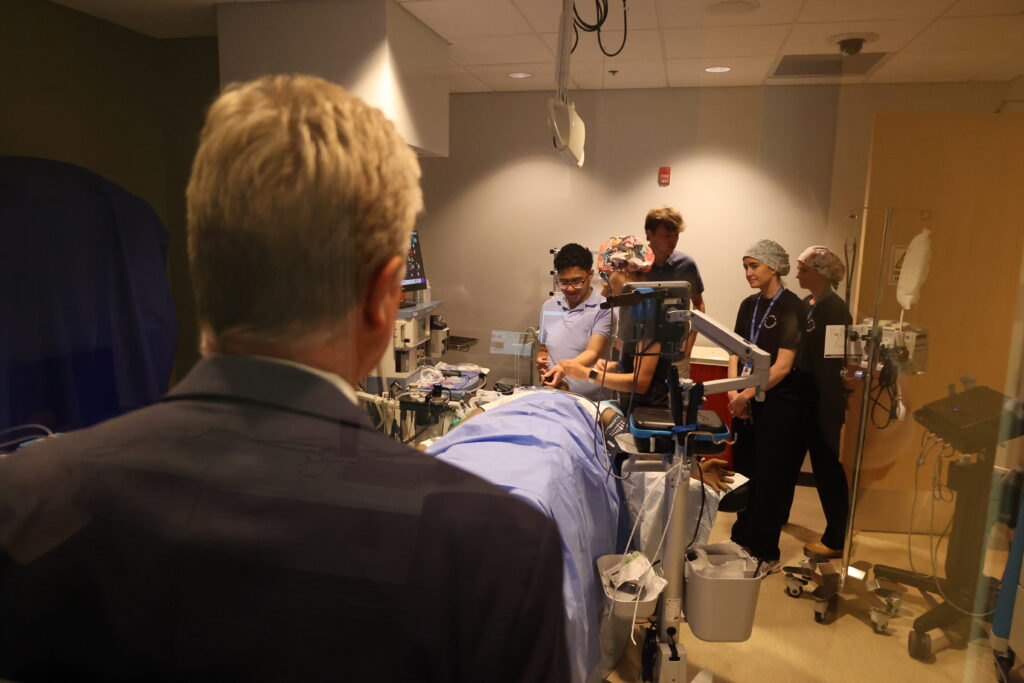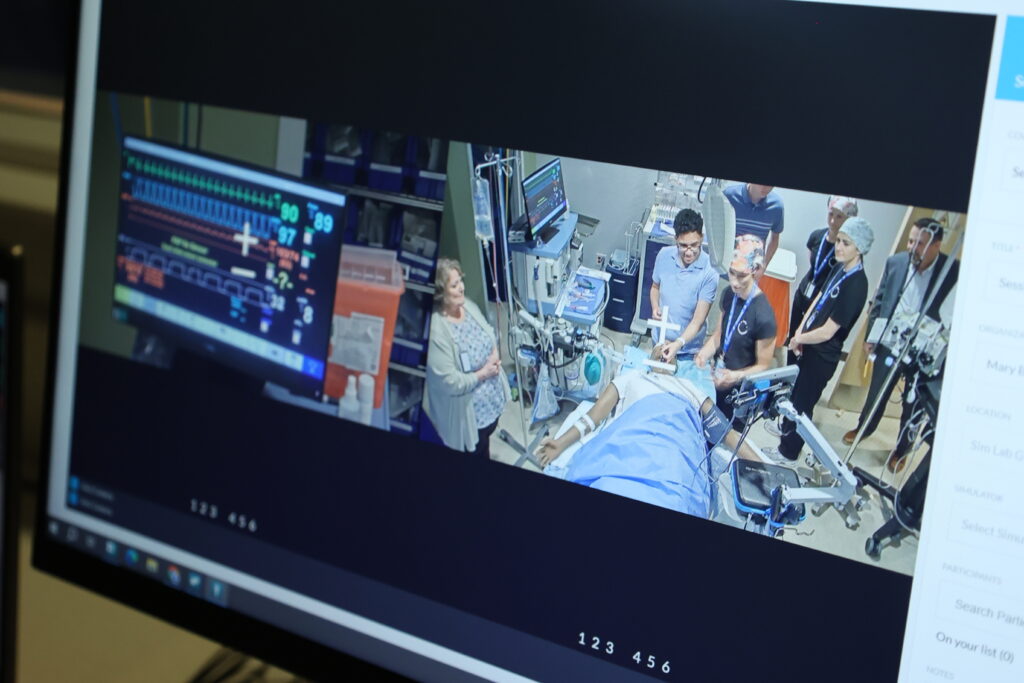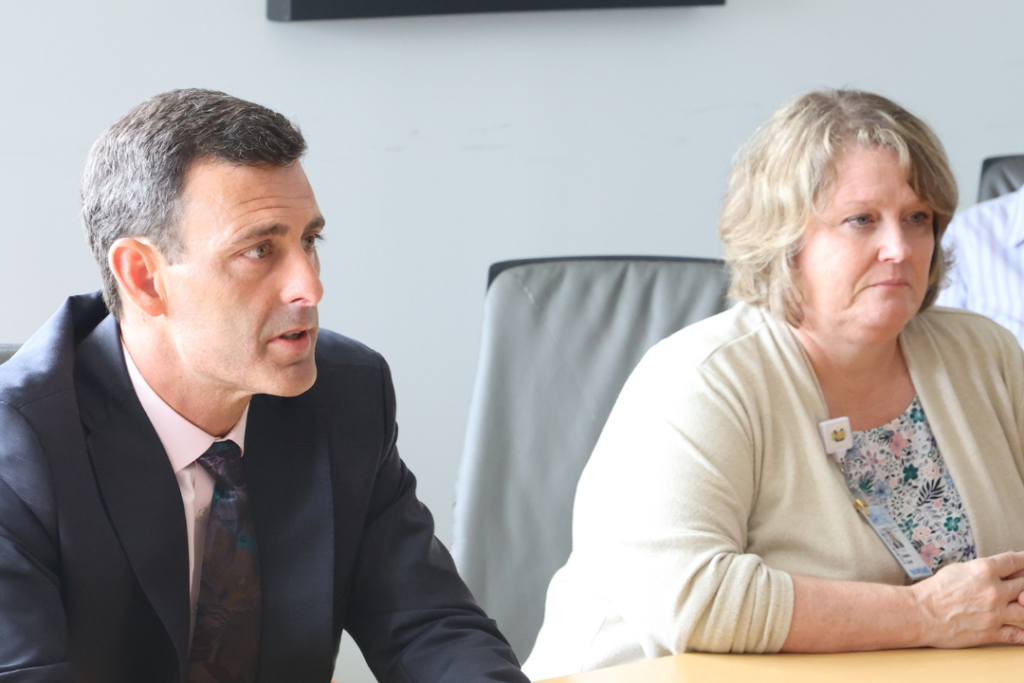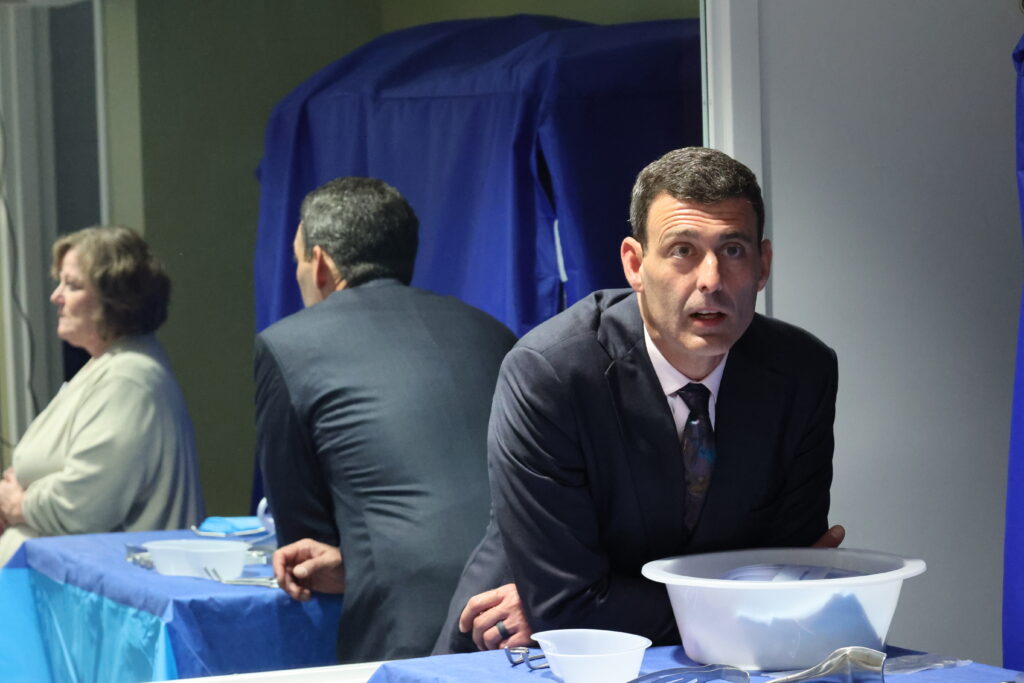Groundbreaking Education with Rural Healthcare at its Heart
Murphy Deming’s Nurse Anesthesiologist program is graduating its first students this spring — and they’re primed to address a critical shortage for their expertise in rural hospitals.
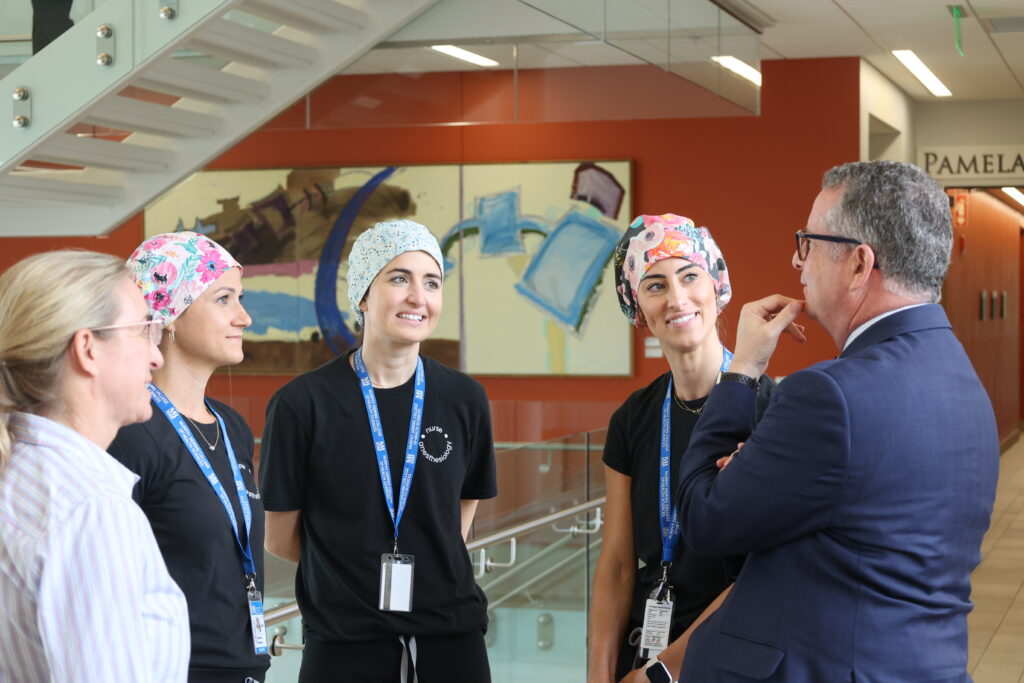
MBU President Jeffrey P. Stein speaks with residents Danielle Donovan, Jena Conway, and Allie Hogg ahead of their demonstration
The first class of Certified Registered Nurse Anesthetists (CRNAs) are slated to graduate from MBU’s Murphy Deming College of Health Sciences at the conclusion of the 2024-25 school year. But first, in mid-July, the CRNA residents welcomed local policymakers and advocates to the Murphy Deming College of Health Sciences campus in Fishersville for a unique demonstration.
At this meeting, on the Murphy Deming campus in Fishersville, Allie Hogg, Danielle Donovan, and Jena Conway represent more than graduate students anxious for commencement. Instead, they’re standing for the future of rural healthcare, the opportunity that Murphy Deming promises for those rural communities, and the critical need for healthcare provider training across the commonwealth.
Nurse anesthesiology is one of Murphy Deming’s Doctor of Nursing Practice (DNP) program options, providing advanced training for nurses to become CRNAs. Nurse practitioners and nurse anesthetists are the first and second fastest-growing careers in healthcare, according to the U.S. Career Institute.
CRNAs specialize in administering anesthesia and managing patients’ pain during surgeries, medical procedures, and childbirth, ensuring patient safety and comfort throughout the process. Usually operating under the supervision of a doctor of anesthesiology, CRNAs are vital to making high-quality anesthesia available to all patients that need it.
The July demonstration was planned and directed by CRNA faculty, including Dr. Derek Owens, assistant professor and director of curriculum, Dr. Barbara Acord, assistant professor and director of simulation, and Dr. Jen McPherson, nurse anesthesiology program director. Virginia State Delegate Chris Runion, representatives from the offices of Delegates Katrina Callsen and Ellen Campbell, and Brian Moran, a lobbyist with the Virginia Association of Nurse Anesthetists (VANA) were also guests in attendance.
It was the students in the program who took center stage, however.
The First Class of Many
Allie Hogg, Danielle Donovan, and Jena Conway are the first to begin their residencies through the program, and are slated to graduate at the end of the 2024-25 school year. Their careers were already well underway, as each has worked as a nurse for years in the UVA health system in Charlottesville.
Bringing their experience and CRNA training to the patient procedure simulation, the three residents got right to work in Murphy Deming’s state-of-the-art simulation lab:
“This starts out as a normal anesthetic induction for a patient who is having a hernia operation,” said Acord, who herself had a long career as a nurse anesthetist, “but, once the patient is anesthetized, we discover that the airway is more difficult than anticipated. So, instead of being able to carry out the standard method, using a direct laryngoscope, the residents need to pull out the video laryngoscope and perform the intubation that way. Then, due to all that complication, the patient becomes tachycardic, which means their heart rate shoots up, and in a patient like this who has a history of heart problems, they begin to have an MI and our residents need to respond to this complication quickly to ensure the patient’s safety.”
An MI, or myocardial infarction, is a heart attack. So, in layman terms, the residents will begin to simulate a normal anesthesia procedure; discover and respond to a complication that unfolds into more complications; and ultimately save the patient’s life from a heart attack while the patient is being put under for surgery.
Working seamlessly as a team and immediately recognizing the operation’s complications as they unfolded, the residents proved their composure and expertise. They answered questions from faculty, government representatives, and industry advocates between the beeping of the monitor and collaborating to navigate the simulation’s challenges. Within just a few minutes, the patient was stable and the procedure was ready to continue (had it been more than a simulation).
After the stress of the simulation was out of the way, the residents invited their guests to try their own hand at anesthesia. Representatives from the delegates’ offices practiced the proper techniques for administering epidural anesthesia, running a breathing tube, and even anesthetizing infants. The patients were all, of course, inanimate.
An Education in and for its Community
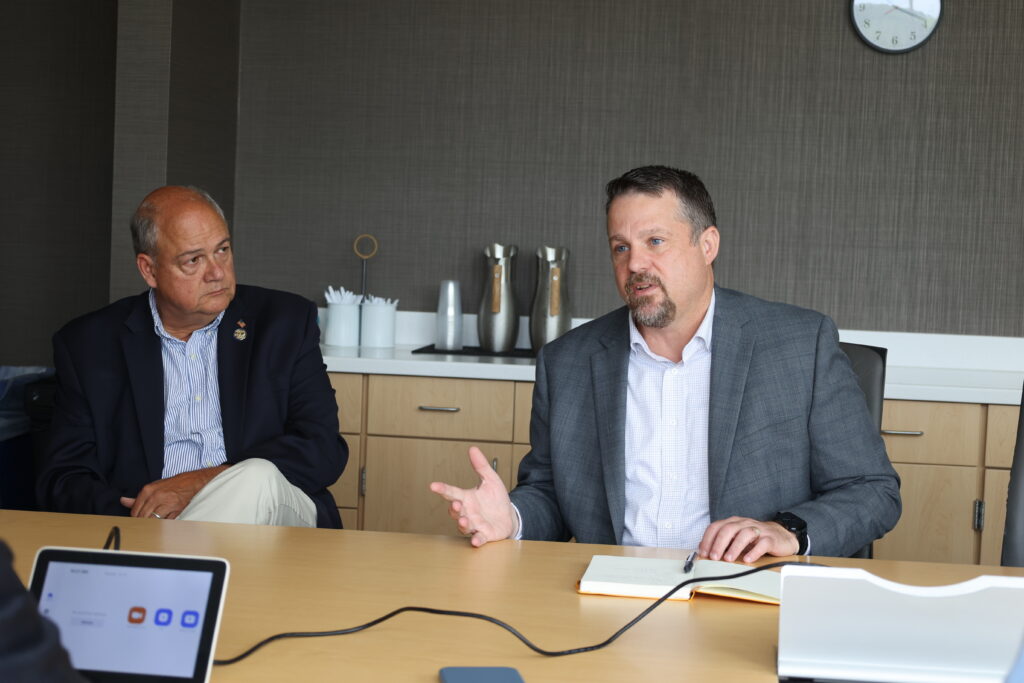
According to Dr. Todd Telemeco, Murphy Deming vice president and dean, “CRNAs are the number-one provider of anesthesia services in the rural environment, and the number-one provider in rural hospitals. This is what we’re trying to do here, because we have the advantage of training nurses in this rural location.”
Telemeco cited personal experience, “I know that, when it comes to healthcare providers, they tend to practice where they learned. There’s a large shortage in this area and in rural areas across the country, and by training about 25 CRNA students a year, the university is trying to make that better.”
This conversation led to the reason for the delegates’ visit and the day’s demonstration: in order to grow at the necessary rate and continue to provide support, Murphy Deming needs the support of the state legislature.
“Virginia has a requirement that CRNA’s are supervised by physicians,” explained Owens. “The Virginia Association of Nurse Anesthetists (VANA) is working to change Virginia regulations to be more modern, in-line with national standards as well as a majority of other states. Virginia requires that CRNAs are supervised by a physician, but 43 other states do not have this requirement. CRNAs practicing independently will allow for greater access to care especially in rural environments. Last year a bill was proposed to change this law, but it did not pass through the senate, so VANA is talking with delegates and senators in the off-season and showing them how CRNAs practice and are educated. Now they can better understand why the physician-supervision requirement is needless oversight that does not increase safety, but does increase cost of care.”
Runion, whose district includes much of Augusta, Bath, and Rockingham counties, confirmed, “There’s not just a shortage; it’s a legitimate healthcare desert for a lot of my constituents.” Over the course of the conversation, everyone in the room agreed: the Shenandoah Valley needs more healthcare providers at all levels, and Murphy Deming is in a strong position to answer that call.
An Accessible Pathway to a Rewarding Future
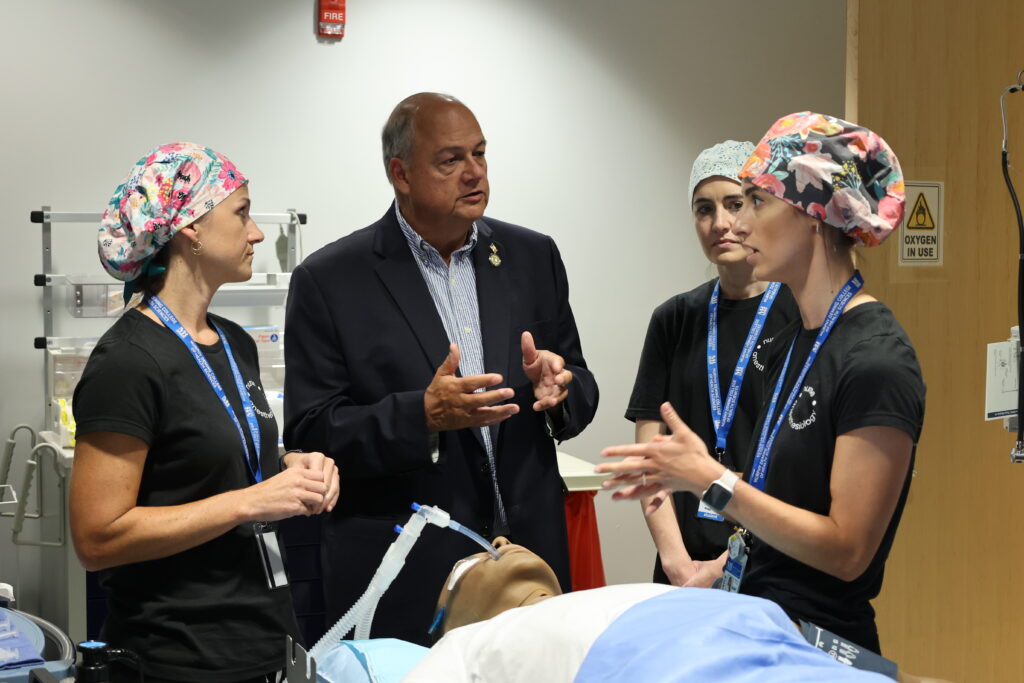
Mary Baldwin’s CRNA program not only has the potential to have a transformative impact on rural healthcare systems in the future — it also transforms the lives of its students and the patients they’re privileged to serve.
Residents Hogg, Donovan, and Conway each brought a unique background to the program from their work at UVA, yet they all shared a common goal: to advance their careers and serve patients at the highest level.
I foresee Murphy Deming being a funnel to bring people from all over the country to this area of Virginia, and they all will love it.
Danielle DonovanCRNA Class of ’25
For Donovan, the opportunity at Murphy Deming came at the perfect time.
“I got my first nursing degree in 2016 and have been a nurse ever since. The medical ICU was my first job where I met Jena and Allie,” she shared. The program’s hybrid design was particularly important to her, allowing her to balance the demands of school with her responsibilities as a mother. “I’ve been a working nurse for a decade, I didn’t want to have to relocate somewhere far away, and I have two small children, so the way the program was designed is huge for me.” Donovan explained. “[The program is] hybrid and it allows me to spend time with my children, but I also have a nice balance with so many clinical sites in the area. So, for me, I feel like I’m getting the best experience possible.”
Conway, who began her nursing career in 2018, echoed the significance of the program’s accessibility. “I moved to the Fishersville area in 2019 and was working in the ICU. I had dreams of going back to school, but it wasn’t until COVID hit that I was really introduced to the whole profession of being a CRNA.” For Conway, the local availability of the program at Murphy Deming was a game-changer. “I planned to apply to a bunch of universities with programs in Virginia and Pennsylvania, but this program opening up was the perfect opportunity for me.”
Support and Challenges
In spite of the growing number of opportunities, the path to becoming a CRNA is not without its challenges. The rigorous training and the time commitment required are immense, particularly for those balancing family life.
Donovan noted, “Everyone tells you before CRNA school that you’ll miss life events, and, having kids, that has been the most challenging thing. But the support from our faculty has been incredible — they’re so supportive, it’s really impossible to single one out and say they do more than any other.”
This supportive environment is one of the program’s greatest strengths, helping students navigate the pressures and demands of their training.
Conway highlighted the high standards to which CRNAs are held: “We are often operating in emergencies, with people who are in a critical situation, so the stress of knowing that’s what we’re preparing for is difficult.” Donovan added, “The biggest learning curve is preparedness … you go from working under someone and then all of a sudden you’re practicing on your own. That’s been a challenge, stepping into the room with a patient where your actions could literally mean life and death.”
A Bright Future in Healthcare
Looking ahead, both Conway and Donovan are optimistic about the future of their profession, and the role Murphy Deming will play in shaping it. Donovan sees the program as a vital conduit for attracting and retaining top talent in the region. “I foresee Murphy Deming being a funnel to bring people from all over the country to this area of Virginia, and they all will love it. I think with the right things in place, like independent practices and infrastructure, those people will want to stay.”
As the first cohort of 23 CRNA students prepares to graduate in 2025, the program’s impact is already evident through these residents: The opportunity to train locally has been nothing short of life-changing, ensuring that they — and the patients they will serve — benefit for years to come.
